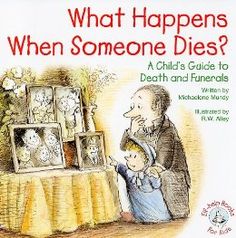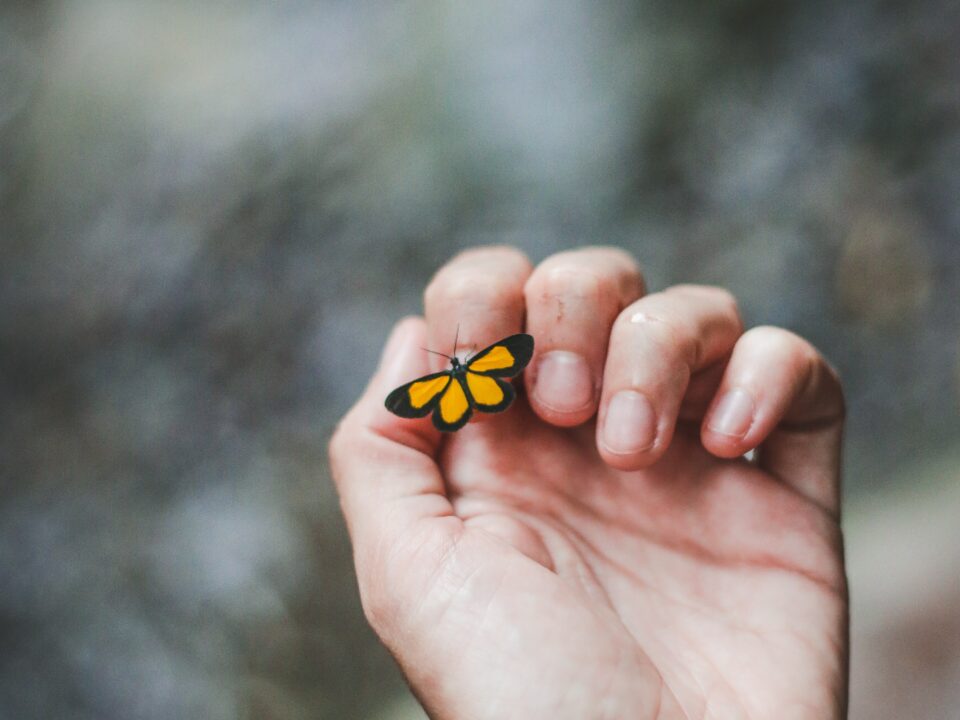What to Tell Children About Funerals
I was recently browsing through the new gift shop at Mission San Juan Capistrano, admiring the jewelry and slowly making my way to my favorite corner of the store; the book section on Grief. I’m always finding new and intriguing titles there and this time, I stumbled upon a series of children’s books on grief that deeply impressed me.
We hear the debate about children being at funerals pretty often around here and while we always encourage people to bring their children, they don’t always agree with us. Well, to my surprise, in the book What Happens When Someone Dies? the question is never even addressed, it is just automatically assumed that children will be there and explains with a delicate, gentle and uncomplicated voice what the child will experience.
Let me give you an example:
Under the question, What should I Say or Do at the Funeral Home? the author writes,
“At the funeral home, people talk about what they remember about the person who died. They talk about nice and sometimes funny times they had with the person. You may hear laughter as they remember happy times.
If you walk up to the casket, take your mom or dad’s hand. We all need each other – especially in sad times. Sometimes the casket is up too high for you to see. Ask someone to help you up.”
I don’t know about you but reading that made me feel better. The explanations are simple but address the hard stuff and don’t shy away from it.
I remember being told when it comes to children to only answer the questions they ask you. You don’t explain the complexities of life and death to your 5 year old when they’ve only asked you why you’re sad. Your answer may lead to more questions and that’s ok, but sometimes children can feel overwhelmed by information that they can’t process or understand. This book is an excellent resource. If you don’t want to read the whole book to them you can still reference this book to help you answer their questions in your own way.
What Happens When Someone Dies? addresses some tough questions like:
- Why do people die?
- Does it hurt to die?
- Are there other ways people say goodbye? (an explanation of cremation)
- What happens at the funeral home?
- What should I say or do at the funeral home?
- Why are some people at the funeral home happy and laughing?
- What should I do at the church funeral service?
- What happens at the cemetery?
- When will everything be ok again?
*These books do have a religious overtones referencing Heaven, God and prayer. I don’t feel they are heavy-hitting but these books may not be appropriate in their entirety for particular faiths.
I continue to be surprised by families who disagree with our funeral arrangers who see day-in and day-out the power of ceremony and how children react and benefit. Our arrangers are experts who can testify endlessly to the power of being included and present at a funeral; but too often a family’s fears and sense of protection keep children from experiencing a ceremony that would actually bring them even greater peace.
 A recent article entitled, “Should Children Attend Funerals?” states that despite public opinion, “child bereavement experts are united in believing that children should be offered the chance to attend funerals, regardless of how young they are.” The article goes on to quote one of these experts, Helen McKinnon, who says, “I’ve never yet come across anyone who regrets going to a funeral as a child. But what we do hear time and time again is those who wish they had gone and in many of those cases, it’s prevented them from starting on their grieving journey.”
A recent article entitled, “Should Children Attend Funerals?” states that despite public opinion, “child bereavement experts are united in believing that children should be offered the chance to attend funerals, regardless of how young they are.” The article goes on to quote one of these experts, Helen McKinnon, who says, “I’ve never yet come across anyone who regrets going to a funeral as a child. But what we do hear time and time again is those who wish they had gone and in many of those cases, it’s prevented them from starting on their grieving journey.”
This same article quotes Christina Brady who had to attend school the same day as her mother’s funeral. She asks the powerful question: “… if adults need a ritual to mark the passing of someone dear to them, doesn’t it follow that children – who are less able than anyone to make sense of the mess of feelings that follow a death – need it even more?”
The answer seems simple: Yes, they do.
There are two messages – this book offers one of understanding, acceptance, and compassion. The other only perpetuates the great fear and avoidance of death our culture has adopted. Let’s give our children the right message.
|| what do you think?
– Where do you stand in this debate and why?
– What answers were you given as a child when you asked about death and how did they help or hinder your understanding?
Other books on tough subjects available in this thoughtful series are:





42 Comments
Molly…..Thank you for sharing this very thoughtful and well written resource for children and death….I am reminded of my 3 year old triplet nephews at my grandfather’s funeral…they first asked “Who shotted him?”….my brother explained to them that no one had been shot, granddad died….their second question was asked as they looked into the half-opened casket, “What happened to his legs?”….a very wise funeral director overheard the question and opened the bottom half of the casket to reveal that indeed granddad’s legs were still there….I have often thought what scars could have been imbedded in my nephews’ minds if it were not for that funeral director…….Mark
The funeral director is a powerful figure – a miracle worker, a myth-demystifier, and a god-send. I love that that story has stuck with you through the years and become a part of your own craft as you help families.
Thank you for all you do Mark!
Molly
Molly,
Such a tough, but necessary topic….
My main advice, be honest! Obviously the content has to be tailored to be age appropriate. I speak from experience. Details were sugar-coated and fabricated to protect me. All it did was cause more confusion and resentment once I learned the truth.
Kids are smart and deserving of knowing the truth about something they will all encounter at some point in their lives. And yes, they should definitely be present for ceremonies.
Lori
Lori,
Honesty is the best policy! How is it so basic yet we create all these empty phrases or protective cages with the hope of masking the truth and avoiding the painful truth. I appreciate your insight and value your point-of-view, I’m also glad it lines up with mine! ; )
Molly
Great subject. Kids should always be included. I think it gives a sense of closure. That their loved one stopped “coming home.” And I think they feel more a part of the family. Thank you Molly for all of your great topics.
Thank you so much Mitch!! I’m glad you found this one interesting, I really appreciate it!
Molly
Molly,
Great topic. Children absolutely need to be involved in some capacity in the ceremonies of their loved one. In fact, depending on the age of the child, it is therapeutic for them to be involved in the planning in some capacity. Whether it is writing a letter to their loved one that could be read at the service or gathering photos for the service, the benefit of them feeling they were a part of the service will have long term benefit on their grief journey.
Thanks for bringing this topic to the forefront.
Fitz
That’s so interesting, Fitz. I didn’t think about the planning side of it but that is such a great idea. it would be such a great exercise to present kids with some options or let them come up with their own way to be involved in the service. Fascinating! Thank you for sharing!
Molly
Molly,
Another stellar blog and such an important topic. I definitely stand on the side of having children attend funerals and participate in the ceremonies. Several studies site that children who view their deceased parent and attend the funeral have a much lower risk of complicated grief. And I know from personal experience that children need to be a part of the family during this time.
Thank you for writing about this. The more we talk about death, grief, bereavement, our final wishes, etc., we slowly begin to undo the stigma surrounding these conversations.
Becky
Thank you so much Becky. I know you have seen first hand the power of having children involved in a service, not only because they need to handle it, but because it gives them a sense of ownership and allows them to take part in an important and meaningful expression.
I always appreciate your perspective,
Molly